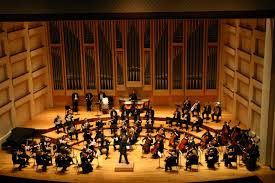记忆方法
记住“orchestra”的方法是将其分解为“orch”和“stra”。想象一个“orch”(类似“orchard”果园的“orch”)被“stra”交通工具(如“street”街道或“train”火车)带到音乐场所。这样,“orchestra”就变成了一个由多种乐器组成的“街道”或“火车车厢”,形象地代表了一个管弦乐团。
以上内容由AI生成, 仅供参考和借鉴
中文词源
orchestra 管弦乐,管弦乐队
来自拉丁语orchestra,管弦乐,来自希腊语erkhesthai,起来,起舞,来自PIE*ergh,升起,上升,词源同origin,orient.比喻用法。
英语词源
- orchestra
-
orchestra: [17] In ancient Greece, the term orkhéstrā denoted a ‘semicircular space at the front of a theatre stage, in which the chorus danced’ (it was a derivative of the verb orkheisthai ‘dance’). English originally took it over (via Latin orchēstra) in this historical sense, but in the early 18th century orchestra began to be used for the ‘part of a theatre where the musicians played’, and hence by extension for the ‘group of musicians’ itself. The derivative orchestrate [19] was adapted from French orchestrer.
- orchestra (n.)
- c. 1600, "area in an ancient theater for the chorus," from Latin orchestra, from Greek orkhestra, semicircular space where the chorus of dancers performed, with suffix -tra denoting place + orkheisthai "to dance," intensive of erkhesthai "to go, come," from PIE root *ergh- "to mount" (cognates: Sanskrit rghayati "trembles, rages, raves," rnoti "rises, moves," arnah "welling stream;" Old Persian rasatiy "he comes;" Greek ornynai "to rouse, start;" Latin oriri "to rise," origo "a beginning;" Gothic rinnan, Old English irnan "to flow, run"). In ancient Rome, it referred to the place in the theater reserved for senators and other dignitaries. Meaning "group of musicians performing at a concert, opera, etc." first recorded 1720; "part of theater in front of the stage" is from 1768.
权威例句
- 1. The orchestra gave its first performance on Whit Monday.
- 乐团在周一的圣灵降临节举行了首场演出。
- 2. Young conductors earn their spurs in a small orchestra or opera house.
- 年轻的指挥家们在小乐队或小歌剧院里崭露头角。
- 3. He had nursed an ambition to lead his own big orchestra.
- 他一直有一个梦想,希望能指挥一支自己的顶级管弦乐队。
- 4. The orchestra contrived to produce some of its best playing for years.
- 这支管弦乐队呈现了精彩的演奏,堪称其多年来的巅峰演奏。
- 5. The orchestra has more discipline now, but at the expense of spirit.
- 那个管弦乐团现在更有纪律性了,却丧失了灵魂。
